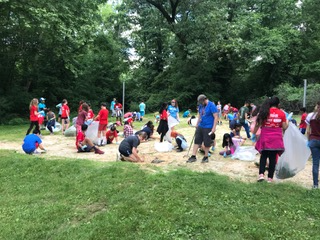The morality of the service hours system

IMAGE: TOWN OF VIENNA
June 2, 2023
In an ironic attempt to ingrain the importance of service within high schoolers, each Fairfax County student has the opportunity to earn a variety of accolades which will distinguish them at graduation, usually with a diploma seal or a cord to be worn along with the traditional cap and gown. The seals and cords are often received for acquiring a certain amount of service hours throughout students’ high school careers. While seemingly a mark of an upstanding student and citizen, when further examining the motives behind their volunteerism, many are arguably driven by selfish intentions.
Having a service minded mentality as a teenager is extremely valuable, as it instills at a young age the importance of caring for others. Being service minded as a teenager plays a pivotal role in transforming students into well rounded adults. Although the high numbers of volunteer hours obtained by high schoolers undoubtedly have a positive impact on the world and community, what strikes concern is the irony of the fact that students are motivated to help others by ultimately helping themselves in gaining awards and experience to put on college applications.
Accolades FCPS students can receive include the Seal for Excellence in Civics Education, commonly known as the Civics Seal, which is given to those with a minimum of 50 service hours, and the Service Learning Cord, for a minimum of 40 service hours.
Encouraging students to volunteer for the sake of gaining hours, while seemingly a positive motivator, is detrimental when it comes to impressing service mindedness in teens. The awards and recognition that can be received taint students’ intentions and stain the moral integrity of volunteering, making it about earning accolades for oneself rather than improving the quality of life for those they are helping. High bar awards with prestigious connotations attractive to the college-oriented student are a primary factor in detracting morality from service. An example of such an award is the Presidential Service Award, given to students if they are a part of the Junior Volunteer League. Students under 16 need at least 50 hours, while 16 and up need over 100.
“The Presidential Service Award motivates me to get my hours to serve my community,” said Caitlin Schweers (’25).
The hours and award can be a great motivator for some who genuinely have a passion for service, such as Schweers, but if not all students attaining these hours have the right intentions, are they really deserving of such recognition?
While students should be recognized for the good they do for their community, it can be tempting to try and rack up as many hours as possible. This is not to say that all students who receive these awards have false intentions, however, it can become easy to forget your purpose when working for hours becomes the goal of service.
Obviously this doesn’t mean that the importance of volunteering as a teen should be less emphasized. However, volunteering needs to be advertised less as something to benefit the volunteer and more to benefit those who receive the service. Whether or not service hours can be obtained should never be the first piece of information provided when sharing a service opportunity with students, because rather than seeing a chance to impact their community, many students see nothing but a number that they can use to boost their college applications.


